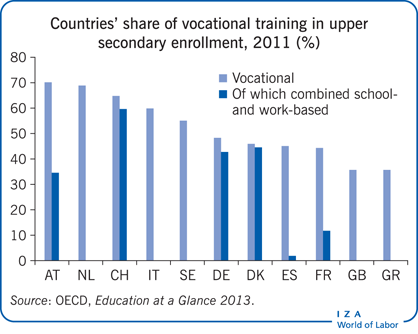The world is developing faster than ever into technology-based practices, students need skills that their traditional education often won't provide. School Leadership and Management Courses can help educators and school leaders openly and proactively consider different ways to help students learn and implement vocations and skill-based learning. It can allow educators to develop learning spaces that not only teach students but enable them to move into what are tomorrow's careers.
7 Ways For Preparing Students For The Future
Vocational education can enter a new phase of learning, suitable to the industry, through being creative, collaborating and coping with change.
To pursue this vision, schools can take these steps:
1. Student-Led Ventures
Schools can foster an atmosphere of skill development when they promote student-led ventures. This allows students to participate in real-world projects and develop skills essential for their future leadership, creativity, and problem-solving.
There are a few things to keep in mind when it comes to student-led ventures:
- Students can define their ventures, including starting their businesses.
- They can have mentors in the community who can assist in development and general oversight.
- They have the freedom to define and manage their project.
2. Local Industry Mentorship
Connecting students with local industry partners is a great way to connect education with real-world work. Industry mentors can provide incredibly insightful information about the daily demands in the job market, while students now possess a first-hand account of various careers.
Some of the benefits of industry mentorship are:
- Students get to learn directly from professionals in their career path.
- Connections to internships and apprenticeships.
- Exposure to a network of local industry partners.
Furthermore, schools can form specialized partnerships with companies to give students experience and guidance.

3. Innovation Hubs and Makerspaces
It's the innovation hubs and makerspaces that provide students with access to tools, technology, and resources to allow them to create, innovate, and experiment! Makerspaces and innovation hubs are all about hands-on learning that allows for creativity and practical skills that students will need in all career pathways.
Why are innovation hubs vital?
- They drive creativity and entrepreneurship
- They provide students with access to technology that is increasingly becoming prevalent in the labour force
- They provide a collaborative space for students to work with others to solve real-world problems
Schools with these spaces allow their students to excel in fast-changing industries by creating a culture of innovation.
4. Future-Oriented Career Discovery Programs
Schools will need to implement job discovery programs for students that can help them explore options, interests, and career paths in the future. It is important to consider the job market today and future career trends.
There are some key pillars of a career discovery program:
- Industry workshops and opportunities to explore career paths
- Assessment of skills and strengths
- Job shadowing and internship opportunities in a variety of jobs or career paths
Career discovery programs allow students to think critically about their decision-making around careers that will assist with their future direction and jobs in a competitive job market.
5. Talent Trade Days
Talent Trade Days are events designed where students are given the opportunity to display their skill sets and network with potential employers or industry professionals. These events allow students to showcase what they learned and open the door to employment opportunities.
How do talent trade days provide students with value?
- Provides a true experience of a job fair
- Builds confidence of students in their skills
- Creates networking opportunities with the industry leaders
Provide transparent exposure to a real-world work environment (seamless link between classroom and workforce), while increasing the opportunity for students to gain valuable employment after graduation.
6. Vocational training for a sustainable future.
Global society is heading towards sustainable practices and vocational training in areas such as renewable energy, environmental management, and sustainable farming and agriculture areas is increasingly essential. Schools should create vocational programs that specifically educate young persons with vocational skills to address global challenges.
Key issues regarding vocational training for sustainability include the following:
- Training in green technology and practices.
- Encouraging student considerations of sustainability in their disciplines.
- Providing experiential learning via projects and internships.
7. Hackathons and Tech Challenges
Hackathons and tech challenges give students a chance to build essential problem-solving skills as they tackle real-world issues. These events center on new ideas and creative thinking, pushing students to come up with fresh solutions and put their knowledge to use on tricky problems.
How hackathons help students:
- Boosts teamwork and working together.
- Builds technical know-how and ways to solve problems.
- Offers a place for students to compete and show off what they can do.
Schools should add these kinds of events to get students involved in tough, creative problem-solving activities that get them ready for jobs down the road.
Bottom Line
Preparing students for tomorrow's jobs means having to plunge into changes from today's manner of schooling. Envisioning vocational training and skill-building ventures students can be equipped with the skills to defend themselves against ever-changing job markets. Education leadership courses online might give educators the necessary tools to provide such transformative experiences in their schools. Through such real-world learning opportunities, the schools shall secure working hand-in-hand career prospects for the students, who shall be academically ready and indeed vocationally ready.









